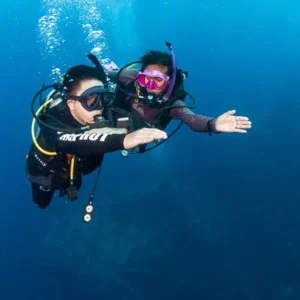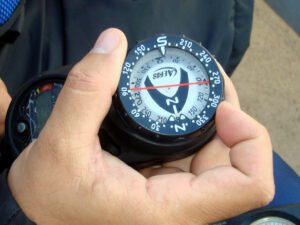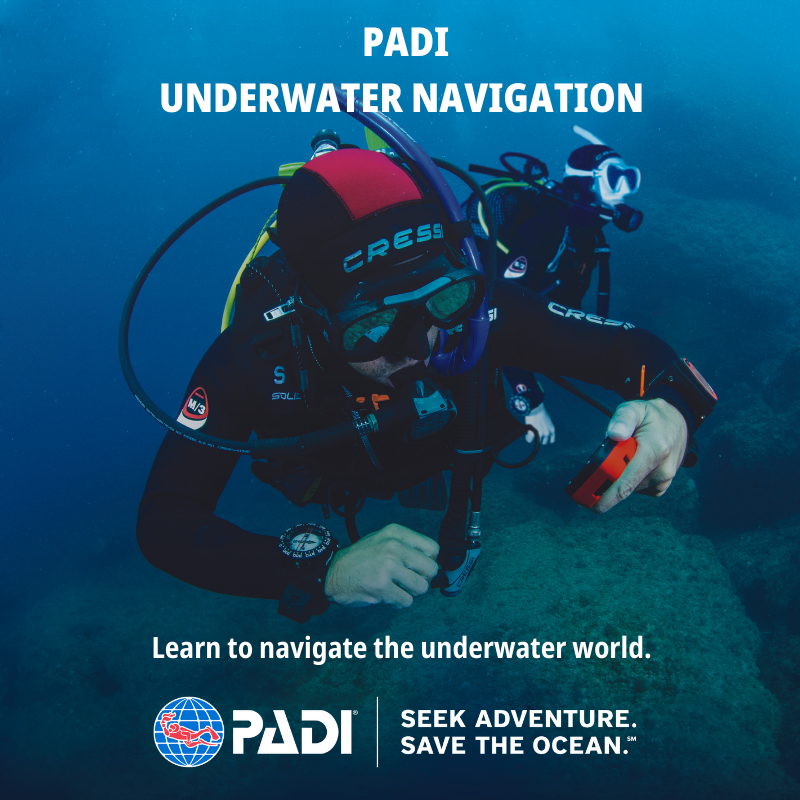PADI Navigation Specialty Course
The PADI Navigation Specialty Course is designed to enhance your underwater navigation skills and make you a more confident and competent diver. This course will teach you how to navigate underwater using a compass and natural navigation techniques. In this blog post, we will discuss how long the course takes, what’s involved, the equipment you will need, and the benefits of taking the PADI Navigation Specialty Course.
The PADI Navigation Specialty Course typically takes around two to three days to complete, depending on the individual’s learning pace and the dive center’s schedule. The course consists of both theory and practical sessions, allowing you to develop a solid understanding of underwater navigation principles before applying them in real-life diving scenarios.
During the theory portion of the course, you will learn about different navigation techniques, such as using a compass, natural navigation cues, and how to plan and execute underwater navigation patterns. You will also gain knowledge on how to measure distances and navigate in various conditions, including low visibility and currents.
Once you have grasped the theoretical concepts, you will move on to the practical sessions, where you will have the opportunity to apply what you have learned in the open water. Under the guidance of a certified PADI instructor, you will practice using a compass and natural navigation techniques to navigate underwater. These hands-on exercises will help you build confidence in your ability to navigate accurately and efficiently.
As for the equipment, you will need standard scuba diving gear, including a mask, fins, snorkel, regulator, buoyancy control device (BCD), and a dive computer or depth gauge and timer. Additionally, you will require a compass specifically designed for underwater navigation. Your instructor will guide you on selecting the right compass and ensure you understand how to use it effectively.
There are numerous benefits to taking the PADI Navigation Specialty Course. Firstly, it enhances your safety as a diver by teaching you how to navigate underwater and find your way back to the starting point or exit point. This skill is particularly crucial when diving in unfamiliar locations or during challenging conditions.
Secondly, mastering underwater navigation allows you to explore dive sites more effectively. Instead of relying solely on your dive guide, you can independently navigate and discover hidden gems underwater. It opens up a whole new world of exploration and allows you to make the most out of your diving experiences.
Lastly, the PADI Navigation Specialty Course is a stepping stone towards becoming a more advanced and well-rounded diver. It is one of the many specialty courses offered by PADI, and completing it can contribute towards earning your Master Scuba Diver rating, the highest non-professional level in recreational diving.
In conclusion, the PADI Navigation Specialty Course is an excellent opportunity for divers to enhance their underwater navigation skills. Through a combination of theory and practical sessions, you will learn how to navigate using a compass and natural navigation techniques. This course not only improves your safety and confidence as a diver but also opens up new possibilities for exploration and advancement in the world of scuba diving.
How Long Does the Course Take?
The duration of the PADI Navigation Specialty Course can vary depending on the dive center or instructor you choose. On average, the course takes about two to three days to complete. This includes classroom sessions, confined water practice, and open water dives.
During the classroom sessions, you will learn the theoretical aspects of underwater navigation, including the use of compasses, natural navigation techniques, and how to navigate using landmarks. The instructor will provide you with detailed explanations and demonstrations to ensure you have a thorough understanding of the concepts.
After the classroom sessions, you will move on to the confined water practice. This is where you will have the opportunity to apply the navigation techniques you learned in a controlled environment. Under the watchful eye of your instructor, you will practice using a compass, maintaining a straight line, and executing turns accurately.
Once you have demonstrated proficiency in the confined water, it’s time for the open water dives. These dives will take place in a real-world diving environment, such as a lake or ocean. During these dives, you will put your navigation skills to the test and navigate underwater using the techniques you learned. Your instructor will be there to guide you and provide feedback to help you improve your skills.
The number of open water dives required to complete the course may vary depending on the dive center or instructor. Some may require two dives, while others may require three or more. These dives will not only allow you to practice your navigation skills but also give you the opportunity to explore the underwater world and enjoy the beauty of marine life.
In addition to the required dives, some instructors may offer optional dives to further enhance your navigation skills. These dives may include more challenging navigation scenarios, such as navigating in low visibility or using natural navigation techniques without a compass. These optional dives can provide you with valuable experience and make you a more confident and competent diver.
Overall, the PADI Navigation Specialty Course is designed to provide you with the knowledge and skills to navigate underwater safely and effectively. The duration of the course may vary, but by the end of it, you will have gained a solid foundation in underwater navigation and be ready to explore new dive sites with confidence.
What’s Involved in the Course?
The PADI Navigation Specialty Course consists of both theoretical and practical components. Here’s an overview of what you can expect:
1. Classroom Sessions
During the classroom sessions, you will learn about the different navigation techniques, equipment, and safety procedures. You will also understand how to use a compass effectively and how to navigate using natural references such as rocks, corals, and marine life. The instructor will provide you with detailed explanations and demonstrations, ensuring that you have a solid understanding of the concepts before moving on to the practical portion of the course.
2. Confined Water Practice
After the classroom sessions, you will have the opportunity to practice your navigation skills in a controlled environment such as a swimming pool or confined water area. Under the guidance of your instructor, you will learn how to use your compass, maintain proper buoyancy, and navigate through various underwater obstacles. The confined water practice sessions will allow you to familiarize yourself with the equipment and techniques in a safe and controlled setting, building your confidence and competence in navigation.
3. Open Water Dives
The final part of the course involves applying your navigation skills in real-life diving scenarios. You will typically complete a minimum of three open water dives, where you will navigate underwater using your compass and natural references. Your instructor will evaluate your skills and provide feedback to help you improve. These open water dives will take place in different dive sites, allowing you to experience various underwater environments and challenges. You will learn how to navigate through currents, use landmarks to orient yourself, and adapt your navigation techniques to different diving conditions.
Throughout the course, safety is a top priority. You will learn how to plan your dives, communicate effectively with your dive buddy, and manage any unexpected situations that may arise during a dive. The PADI Navigation Specialty Course not only enhances your underwater navigation skills but also equips you with the knowledge and confidence to explore new dive sites independently.
Equipment Needed
For the PADI Navigation Specialty Course, you will need the following equipment:
1. Scuba Gear
You will need your own scuba gear or you can rent it from the dive center. This includes a mask, snorkel, fins, BCD (buoyancy control device), regulator, and dive computer. It is important to ensure that your scuba gear is in good working condition and properly fitted before starting the course. This will help you have a comfortable and safe diving experience.
2. Compass
A compass is an essential tool for underwater navigation. Make sure you have a reliable compass that is suitable for diving. There are different types of compasses available, such as wrist-mounted compasses or compasses that can be attached to your BCD. Choose one that you are comfortable using and can easily access during your dives.
3. Dive Slate
A dive slate is a small underwater writing slate that allows you to make notes and draw maps underwater. It can be helpful for recording navigation bearings and making sketches of dive sites. When choosing a dive slate, look for one that is durable and has a clip or strap to secure it to your gear. This will ensure that you can easily access it when needed and it won’t get lost during your dives.
4. Dive Light
A dive light is not always necessary for navigation during the day, but it can be useful for illuminating your compass or dive slate in low light conditions or during night dives. When selecting a dive light, consider its brightness, battery life, and durability. It is also important to check if the dive light is suitable for diving at your planned dive depths.
5. Surface Marker Buoy (SMB)
An SMB is a buoy that you can deploy at the surface to signal your position to the boat or other divers. While not directly related to navigation, it is a good safety device to have when diving. An SMB can help ensure that you are easily visible to others on the surface and can assist with your ascent and safety stops. Choose an SMB that is brightly colored and has a line or reel to easily deploy and retrieve it.
Having the right equipment is crucial for the PADI Navigation Specialty Course. It will not only enhance your navigation skills but also contribute to a safe and enjoyable diving experience. Make sure to check your equipment before each dive and familiarize yourself with its operation. By being well-prepared, you can make the most out of your navigation training and explore the underwater world with confidence.
6. Increased Confidence and Independence
Mastering navigation skills through the PADI Navigation Specialty Course will not only enhance your diving abilities but also boost your confidence underwater. As you become more proficient in navigating, you will feel more comfortable exploring new dive sites and venturing further from the dive boat or shore. This increased confidence will also make you a more independent diver, as you will rely less on dive guides or buddies for navigation.
7. Improved Underwater Awareness
During the course, you will learn not only how to navigate from point A to point B but also how to observe and interpret underwater signs and landmarks. This will sharpen your overall underwater awareness and make you a more observant diver. You will start noticing small details, such as different species of marine life or interesting geological formations, that you may have overlooked before. This heightened awareness will enrich your diving experience and deepen your connection with the underwater world.
8. Valuable Life Skills
The skills you acquire during the PADI Navigation Specialty Course are not only applicable to diving but also have practical applications in everyday life. The ability to navigate accurately and plan routes effectively is useful in various situations, such as hiking, traveling, or even driving in unfamiliar areas. These transferable skills will benefit you beyond the realm of diving and contribute to your personal growth and self-reliance.
9. Networking Opportunities
Participating in the PADI Navigation Specialty Course provides an excellent opportunity to connect with other divers who share your passion for exploration and adventure. You will meet like-minded individuals during the course and have the chance to build lasting friendships and dive buddies. These connections can open doors to new diving opportunities, as you exchange knowledge, experiences, and recommendations with fellow divers.
10. Environmental Awareness
As part of the PADI Navigation Specialty Course, you will learn about the importance of underwater conservation and how to minimize your impact on the marine environment. This course emphasizes the significance of respecting natural resources and ecosystems, promoting responsible diving practices. By becoming more environmentally conscious, you will contribute to the preservation of marine life and habitats, ensuring that future generations can continue to enjoy the wonders of the underwater world.
